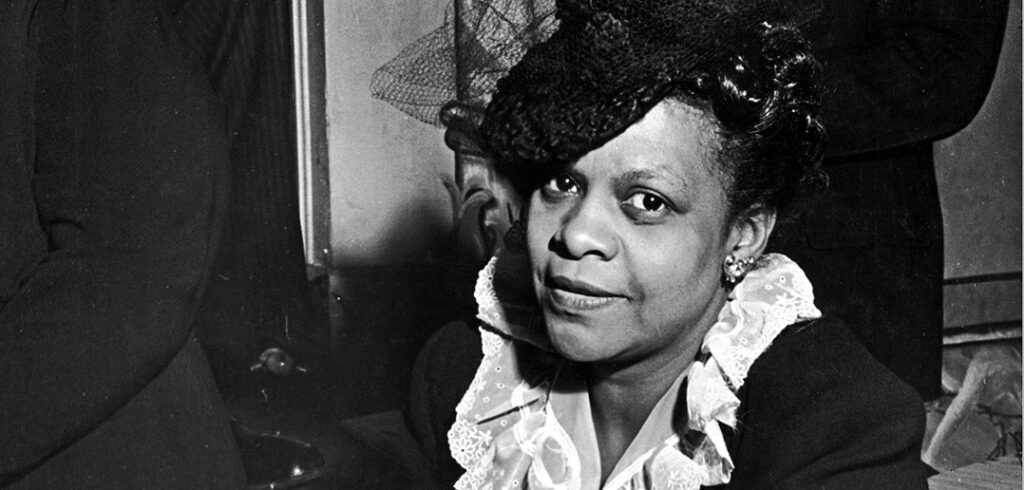Once overlooked, Eunice Hunton Carter has been getting her due in recent years, not only for being the only woman—a Black woman, no less—on the legal team that successfully prosecuted infamous mob boss Charles “Lucky” Luciano in 1936 but also as an early civil rights leader. This is thanks in part to a new book from Fordham University Press that recently earned a 2022 PROSE Award for best biography.
Carter began to garner a bit of widespread attention in 2018, when her grandson Stephen L. Carter published Invisible: The Forgotten Story of the Black Woman Lawyer Who Took Down America’s Most Powerful Mobster. Several years earlier, the writers of the HBO show Boardwalk Empire created a character who, like Carter, was largely responsible for the conviction of a Prohibition-era mobster. (At the time, the character spurred mocking among viewers, who were sure that such a person—a Black female prosecutor—was pure fantasy.)
In Eunice Hunton Carter: A Lifelong Fight for Social Justice, Marilyn Greenwald and Yun Li use transcripts, letters, and other archival sources to illuminate Carter’s rich life, from her participation in the Harlem Renaissance and her devising the strategy that would crack open the Luciano case to her involvement with the United Nations and the Pan-African Congress, which helped increase awareness of racism and spur independence movements. Despite all this, though, the authors note that she was “low-key” and “she didn’t boast about her accomplishments.”
Born in Atlanta, she grew up in a family dedicated to social justice. Her father, William Alphaeus Hunton, was a Black YMCA administrator who fought to establish facilities for people of color. And Carter’s mother, Adelina “Addie” Hunton, “never one to remain stationary and tend to the home,” traveled extensively as a civil rights activist and women’s suffragist, including to France during World War I to help rally Black U.S. troops serving there.
Carter earned her bachelor’s and master’s degrees from Smith College—only the second woman in Smith history to earn both within four years. After graduating from Fordham Law School in 1932, she started a private law practice. But it was her 1935 appointment to special prosecutor Thomas E. Dewey’s “Twenty Against the Underworld” legal team that ultimately led to her lasting renown.
As the authors write, “Carter’s decades-long commitment to organizations that furthered racial equality in this country and overseas has long been a footnote in the story of the nation’s civil rights and feminist movements,” but her “dogged determination, fearlessness, and devotion to hard work” allowed her to shape history. Carter followed in her parents’ footsteps when she became a national leader of the YWCA and a member of the U.S. National Council of Negro Women, taking up William’s YMCA torch and Addie’s dedication to women’s suffrage. She served as the liaison to the Women’s Day Court when she was an assistant district attorney, as well.
Fordham Law School recently established the annual Eunice Carter Lecture in her honor. Earlier this month, Nikole Hannah-Jones, creator of The New York Times Magazine’s “1619 Project” and author of the new book The 1619 Project: A New Origin Story, delivered the inaugural lecture.
During the event, held via Zoom and in person at the Lincoln Center campus, Fordham Law Professor Catherine Powell shared some reflections on Carter with a combined audience of more than 500 people, including Carter’s great-granddaughter Leah.
“When I looked up Eunice’s story and realized her work at the U.N.—in advancing the status of women—and her work with the Pan-African Congress, I thought this woman actually embodies the kind of work that I’ve been trying to do since graduating from law school,” Powell said. “Your great-grandmother worked on these issues before we had the term ‘intersectionality.’”
Leah Carter said she believes her great-grandmother would have been “incredibly honored” by the event. “Eunice blazed trails and broke glass ceilings. And, like so many who do, she gained power and influence within deeply imperfect institutions,” she said. “But she tried to make a difference where she could.”
The annual PROSE Awards, given by the Association of American Publishers since 1976, honor authors, editors, and publishers of works that exhibit scholarly excellence and significantly advance their fields.

